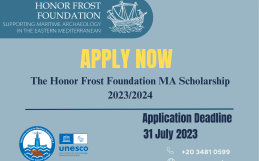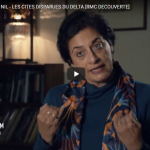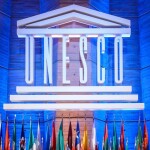UNESCO Online Training of Trainers (ToT) on the Underwater Cultural Heritage (UCH) Management for Sustainable Developments in the Arab States.
Within the framework of collaboration between Alexandria University, represented by the Alexandria Centre for Maritime Archaeology and Underwater Cultural Heritage (CMAUCH), and UNESCO, represented by the Regional Office in Cairo, an online Training of Trainers (ToT) on “Underwater Cultural Heritage Management and Sustainable Development in the Arab States” was organized during the period from the 14 th to the16 th of December 2020.
Eight Arab countries participated in this training (Algeria, Egypt, Jordan, Lebanon, Morocco,Oman, Sudan, Tunisia).
This Training is the first of its kind organized by the Alexandria University and UNESCO, and it is the first phase of a number of capacity building activities to be held within the framework of the UNESCO 2001 Convention for the Protection of the Underwater Cultural Heritage.
– The first day of the online training course included opening notes from representatives of UNESCO HQ in Paris and the Regional Office in Cairo. This was followed by a series of presentations about the situation of UCH in each of the participating Arab countries.
Mr. Rafik Khellaf from the University Center of Tipaza, representing Algeria, gave a presentation about the current situation of the underwater archaeology in Algeria. Then Mr. Mohamed Aly, from the Central Department of Underwater Antiquities, Ministry of Tourism and Antiquities in Egypt gave a presentation on the history, development, and current research in underwater archaeology in Egypt. This was followed by Mr. Maher Al- Amreyn, inspector of antiquities in Aqaba, who gave a presentation on the important costal sites in Jordan including the Islamic port of Ayla. Following that, Mr. Aly Badawi, Director of the South Lebanon Region at the General Department of Antiquities, presented the several activities and projects conducted in Lebanon in the field of underwater cultural heritage. Then, from Morocco, Mr. Ezzedine Karra, from the Ministry of Culture in Morocco, gave a presentation on the discovery and research of UCH in Morocco. The second day of the training course included a presentation by Mrs. Chihiro Nishikawa from UNESCO about the UNESCO Convention on the Protection of the Underwater Cultural Heritage which has been ratified so far by 66 countries, including 12 Arab countries. After that, Dr. Emad Khalil, Director of the Maritime Archaeology and Underwater Cultural Heritage at Alexandria University, gave a presentation on the best practices that UNESCO has registered in the field of UCHin a number of countries, including Spain, Mexico, Portugal, and France. This was followed by a presentation by Mr. Ayyob Al Bosaidi from the Ministry of Heritage and Culture in Oman who introduced the experience of Oman in exploring and investigating several underwater archaeological sites. Moreover, Mr. Abdelhai Abdelsawy, from the Department of Restoration in Sudan, presented the archaeological potentials that Sudan has in the field of underwater archeology, especially in the Nile. Then, Mr. Ahmed Gadhoum, from the National Institute of Heritage in Tunisia, reviewed several research projects that were carried out in Tunisia in the field of underwater archeology. Finally, Dr. Emad Khalil concluded the day with his presentation on “Maritime Archaeology Development and scope”. – On the third day, Dr. Taufik Hamoum, from National Center for Archeology Research in Algeria, and the President of the UNESCO 2001 Convention Technical and Scientific Advisory Body (STAB) spoke about the role of STAB in the service of UCH and the
2001 convention. It is worth noting that the committee consists of 14 members, including three from Arab countries: Algeria, Morocco, and Egypt. After that, Mr. Ziad Morsi, from the University of Southampton, talked about “Education and Capacity Building for Underwater Cultural Heritage Management”. Then Dr. Lucy Blue from the University of Southampton who gave a presentation about UNESCO UNITWIN Network for Underwater Archaeology and the role of a number of civil society institutions in supporting UCH in the Arab region. Finally, Dr. Emad Khalil presented a report on the Education and Training for underwater cultural heritage in the Arab region. The training course ended with a discussion concerning the next phase of training and capacity building in the Arab Region countries in the field of underwater archeology, under the UNESCO umbrella.
في إطار التعاون بين جامعة الاسكندرية متمثله فى مركز الآثار البحرية والتراث الثقافي الغارق، ومنظمة اليونسكو متمثلة في المكتب الإقليمي لليونسكو بالقاهرة، تم خلال الفترة من 14 إلي 16 ديسمبر 2020، تنظيم دورة تدربيبة تحت عنوان :
“تدريب المدربين لإدارة التراث الثقافي المغمور بالمياة من أجل التنمية المستدامة في البلدان العربية”
وقد شاركت ثماني دول عربية في الدورة، وهي الجزائر، ومصر، والأردن، ولبنان، والمغرب، وسلطنة عمان، والسودان، وتونس. وتعتبر هذه الدورة هي الأولي من نوعها التي تنظمها جامعة الإسكندرية ومنظمة اليونسكو، وهي المرحلة الأولي من عدد من الدورات المزمع إقامتها في إطار اتفاقية اليونسكو لحماية التراث الثقافي المغمور بالمياه.
ضم اليوم الأول من الدورة التدريبية كلمات اففتاحية من ممثلي منظمة اليونسكو في باريس، وفي المكتب الإقليمي بالقاهرة. تبع ذلك مجموعة من العروض تقديمية عن وضع التراث الثقافي المغمور بالمياه في كل بلد من البلدان العربية المشاركة. قام السيد/ رفيق خلاف من المركز الجامعي لتيبازة ،ممثلاً للجزائر بتقديم عرض حول وضع الآثار المغمورة بالمياه في الجزائر. ثم قدم السيد/ محمد علي من الإدارة المركزية للآثار الغارقة بوزارة السياحة والآثار المصرية بتقديم عرض حول تاريخ وتطور ومشروعات دراسة الآثار الغارقة في مصر. تلي ذلك قيام السيد/ ماهر العمرين، مفتش الآثار بالعقبة، بتقديم عرض عن أهم المواقع الساحلة الموجودة في الأردن، بما في ذلك موقع ميناء أيلة الإسلامي الغارق. أعقب ذلك قيام السيد/ علي بدوي، مدير منطقة جنوب لبنان بالإدارة العامة للآثار، بعرض الأنشطة والمشروعات العديد التي تقوم بها لبنان في مجال التراث الثقافي المغمور بالمياه. ومن المغرب، قام السيد/ عزالدين كرا، من وزارة الثقافة بالمغرب بتقديم عرض حول نشاط دولة المغرب في اكتشاف ودراسة التراث الثقافي المغمور بالمياه.
تناول اليوم الثاني من فعاليات الدورة التدريبية عرضا من السيدة/ شيهيرو نيشيكاوا من اليونسكو بالتعريف بأهم بنود واتفاقية اليونسكو بشأن حماية التراث الثقافي المغمور بالمياه، والتي صادق عليها حتي الآن 66 دولة من بينها 12 دولة عربية.
بعد ذلك قام الدكتور عماد خليل، مدير مركز الآثار البحرية بجامعة الإسكندرية، بتقديم عرض حول أفضل الممارسات التي قامت منظمة اليونسكو بتسجيلها في مجال التراث الثقافي المغمور بالمياه في عدد من الدول منها أسبانيا، والمكسيك، والبرتغال، وفرنسا. تلي ذلك قيام السيد/ أيوب البوسعيدي من وزارة التراث والثقافة العمانية، بعرض تجربة سلطنة عمان في مجال اكتشاف الاثار المغموره بالمياه. ثم قام السيد/ عبد الحي الصاوي، من إدارة الترميم بالسودان، باستعراض الإمكانات الأثرية التي تتمتع بها السودان في مجال الآثار المغمورة، خاصة في النيل. أعقب ذلك قام السيد/ أحمد قضوم، من المعهد الوطني للتراث بتونس، باستعراض مختلف المشروعات البحثية التي تمت في تونس في مجال الآثار المغمورة بالمياه. أخيراً، قام الدكتور عماد خليل بإختتام اليوم بعرضه التقديمي عن “الآثار البحرية : التطور والهدف”.
في اليوم الثالث، قام الدكتور/ توفيق حموم، من المركز الوطني للبحث في علم الآثار بالجزائر، ورئيس اللجنة الاستشارية الفنية والعلمية لليونسكو في مجال التراث الثقافي المغمور بالمياه، بالحديث عن اللجنة ودورها علي المستوي الدولي. ومن الجدير بالذكر أن اللجنة تتكون من 14 عضواً من بينهم ثلاثة أعضاء من دول عربية هي الجزائر والمغرب ومصر. بعد ذلك قام السيد/ زياد مرسي، من جامعة ساوثهامتون، بإلقاء عرضه التقديمي عن ” تعليم و بناء القدرات في مجال التراث الثقافي المغمور بالمياه من المنظور الدولي”. تلي ذلك قيام الدكتوره لوسي بلو من جامعة ساوثهامتون بتقديم عرض حول شبكة اليونسكو لتوأمة الجامعات في مجال الآثار المغمورة بالمياه، ودور عدد من مؤسسات المجتمع المدني في دعم هذا المجال في المنطقة العربية. أخيراُ قام الدكتور عماد خليل بعرض تقريرا عن التعليم و التدريب في مجال التراث الثقافي المغمور بالمياه في المنطقة العربية. وقد اختتمت الدورة التدريبية بمناقشة المرحلة المقلبة من التدريب وبناء الكوادر في الدول العربية في مجال الآثار المغمورة بالمياه، وذلك تحت رعاية منظمة اليونسكو.


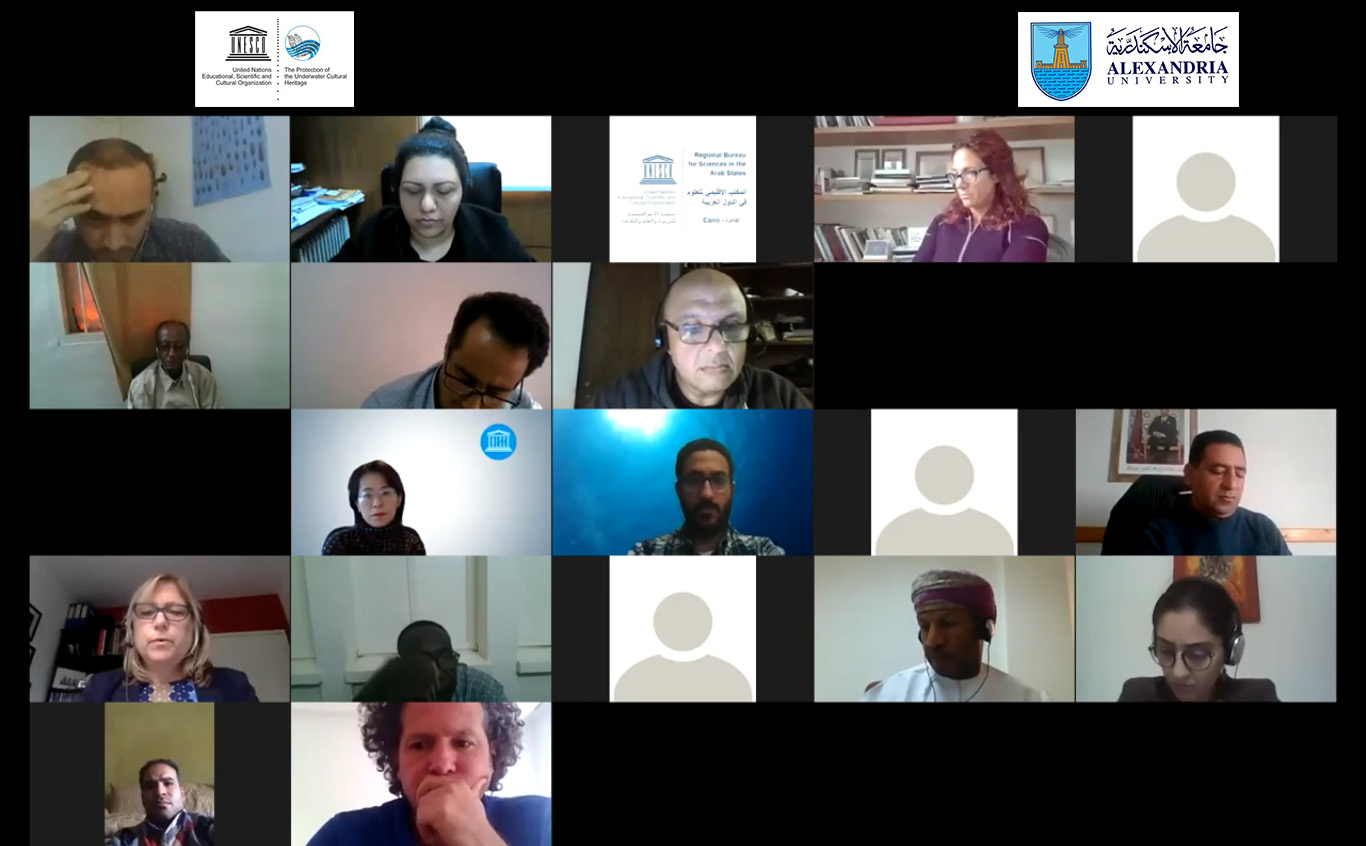

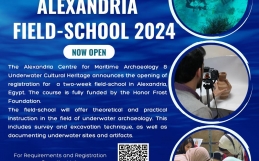
![Reframing Heritage Education in Egypt [Re-HeED]](http://www.cmauch.org/wp-content/uploads/bfi_thumb/logo-2-qbodo826knmpbhc4p9f5ihra2pk39wblpxi55kzrbe.jpg)
